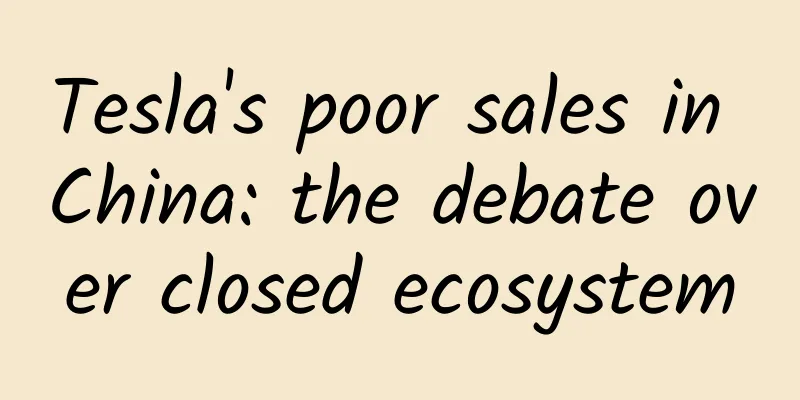Tesla's poor sales in China: the debate over closed ecosystem

|
On June 17, Tesla announced that the Model S has driven 1 billion miles, or about 1.6 billion kilometers, around the world. Among them, the Tesla Model S in the Chinese market has driven 44.73 million kilometers. Tesla's mileage in China accounts for less than 3% of the global total, which, to a certain extent, also shows that the sales volume of Tesla in China does not account for a high proportion in the world. When Tesla first entered the Chinese market, it hoped that the Chinese market could contribute more than 30% of its global sales. After all, China is the world's largest auto market and will soon become the world's largest smart car market. But disappointingly, according to Tesla's 2014 financial report, sales in the Asia-Pacific region only accounted for 15% of Tesla's global sales, about 4,700 vehicles. In 2014, Tesla's annual sales reached 31,655 vehicles. In March 2015, Tesla CEO Elon Musk came to China. Regarding the current situation of the Chinese market, he said at the time: "China is the only market in the world where Tesla has excess inventory. We are still digesting the inventory." Afterwards, Tesla adjusted its Chinese team and launched the "2015 China Strategy", introducing unique services such as "over-the-air upgrades", "remote diagnosis", nearly "zero maintenance", and "used car recycling". Tesla has not announced to what extent the "2015 China Strategy" has increased Tesla's sales. However, all the service models of the "2015 China Strategy" are unique because they are all built on Tesla's "closed ecosystem." Direct sales model The most obvious closed aspect of Tesla is its "direct sales model". It is reported that Tesla does not authorize any dealers, distributors, or other third-party organizations to sell its products. This direct sales model allows Tesla to directly face the end consumers, skipping the middle link, and can provide integrated services from test drives, private customization, delivery to after-sales. Moreover, Tesla can also make prices completely transparent. Taking the Model S 85 as an example, its price of 734,000 yuan is equal to the sum of the US selling price, transportation and handling fees, tariffs and value-added tax. All fees can be checked on the official website, and there is no other price increase. Tesla has introduced the Internet marketing model into the automotive field, and recently introduced the "financial and used car recycling" service. Tesla and CITIC Bank provide loan services, with a down payment of 20% and a loan term of up to 60 months. Consumers only need to pay a minimum of 20% down payment. This service will be gradually launched in more than 100 cities across the country from July. Moreover, eligible customers can choose to sell the Model S to Tesla at 50% of the purchase price three years after the car is delivered. However, abandoning the more efficient distribution model has forced Tesla to build its own marketing system. Currently, Tesla has built 11 experience stores and service centers in 7 cities including Beijing, Shanghai, Hangzhou, Shenzhen, Chengdu, Xi'an and Hong Kong, and the number is still increasing. These marketing systems can still support Tesla's business. However, according to Tesla's plan, in 2017, Tesla plans to launch the Model 3 with a price of about 300,000 yuan. By then, the price reduction will inevitably lead to an increase in sales, and it is still unknown whether the direct sales model will hinder business development. Moreover, the direct sales model excludes most partners, which also forces Tesla to build all supporting systems, such as charging piles. So far, Tesla has built hundreds of super charging piles and 1,300 destination charging stations in China. In addition, Tesla has built home charging piles for 90% of Chinese users for free. Since Tesla has an ultra-long range of 502 kilometers, home charging piles can solve 99% of users' electricity needs. Similarly, the charging infrastructure is also closed. Tesla charging piles do not provide services to the outside world, and cannot use charging facilities built by other companies or institutions. A Tesla engineer said: "The Ministry of Industry and Information Technology is currently formulating a national unified charging standard. At that time, Tesla will be able to use public charging piles through interface conversion." However, Tesla will not change its own charging technology. In addition, Tesla's application system is not open to the public, and third-party applications cannot be installed. All operating applications are independently developed by Tesla, such as over-the-air upgrades, automatic driving, emergency braking, lane changing, weather recognition and other applications. Closed vs. Open In contrast to Tesla, all other smart car players adopt a group model. In 2014, Apple launched iOS in the Car, promoting the connection between iPhone and in-car devices; Google followed closely and joined forces with mainstream auto giants to create the Open Automotive Alliance. In China, in March 2015, Baidu announced that it would cooperate with a certain auto manufacturer to launch smart cars this year; Tencent signed a "Strategic Cooperation Framework Agreement on 'Internet + Smart Electric Vehicles'" with Foxconn Technology Group and Harmony Auto; Alibaba and SAIC Motors jointly established a 1 billion yuan Internet Auto Fund and planned to launch cars in 2016. Later, Alibaba signed a strategic cooperation agreement with Shanghai GM, and the two parties will carry out all-round innovative cooperation in four major areas: automotive big data marketing, automotive finance, original after-sales O2O business and second-hand car replacement. Including LeTV, it has also announced its super car strategy. Although these attempts are dazzling, Tesla believes that "to make smart cars well, a closed ecosystem is necessary." Tao Rong, communications director of Tesla China, said that the ecosystem covers core technologies, marketing models, and supply chain systems. "All technologies, applications, and products must be controlled within our own system." For example, Tesla's mechatronics technology. Tesla's cars are equipped with thousands of customized batteries, and it has independently developed a powerful battery master control module that can accurately monitor the temperature and operation of each battery. If any battery has a problem, this system can bypass that battery alone to maintain the safety of the entire battery pack and improve energy utilization. "If the batteries, modules, and operating systems come from several companies, it will be extremely difficult to integrate them and it will be impossible to achieve these experiences." As for cooperation with some payment and application companies, Tesla does not seem to be very interested at present. Tao Rong believes: "The industry has already discussed a lot about business cooperation and innovation, and maybe we will consider it in the future. But first of all, users need a great smart car." There is no doubt that Tesla has been regarded by most people as the pioneer of global smart electric vehicles. However, Tesla's business model is becoming increasingly difficult to replicate. After all, the burden of doing everything by itself is obvious. Tesla must spend a lot of money on R&D, hiring workers, purchasing parts, deploying production lines, etc. In 2014, Tesla's procurement expenses in China reached US$250 million, and it is expected to exceed US$500 million in 2015. The construction of charging facilities is also a huge expense. On June 17, according to US media reports, a series of banks including Bank of America, JPMorgan Chase and Deutsche Bank have injected up to US$750 million into Tesla Motors in the form of loans. As a winner of Toutiao's Qingyun Plan and Baijiahao's Bai+ Plan, the 2019 Baidu Digital Author of the Year, the Baijiahao's Most Popular Author in the Technology Field, the 2019 Sogou Technology and Culture Author, and the 2021 Baijiahao Quarterly Influential Creator, he has won many awards, including the 2013 Sohu Best Industry Media Person, the 2015 China New Media Entrepreneurship Competition Beijing Third Place, the 2015 Guangmang Experience Award, the 2015 China New Media Entrepreneurship Competition Finals Third Place, and the 2018 Baidu Dynamic Annual Powerful Celebrity. |
<<: Can the dream of establishing a TV cinema chain by joining hands with Alibaba Gehua come true?
>>: Oculus: Facebook's next-generation hookup tool?
Recommend
These four ways of feed flow advertising can turn your readers from being "raped" to "enjoying"
The trend of the mobile Internet era is irreversi...
Why did Alipay copy WeChat’s red envelope function?
[[140409]] On July 8, Alipay released the latest ...
42 marketing tips hidden by marketers!
Marketing guru Ted Levitt once said: There is no ...
Changsha’s tea tasting studio is built in. Where is the most reliable tea drinking place?
Changsha Tea Tasting Studio has its own arrangeme...
Did the male mantis in "Black Cat Sheriff" really volunteer to be eaten?
If dating means potentially losing your life, wou...
Introduction to OPPO App Store Information Stream Ads
FAQ - Information Stream Advertising Advertising ...
How to build a perfect bidding promotion account?
I believe every SEMer is well aware of the import...
Overglaze vs. Underglaze: The Art and Safety of Tableware Selection!
Audit expert: Peng Guoqiu Deputy Chief Physician,...
How to double the click-through rate of your creative content? Just read this article!
With the explosion of information flow advertisin...
How to avoid "making things worse" in brand crisis public relations?
Introduction: "There is an important role in...
Event Operation | How to organize an event with a high degree of completion?
How can an operator carry out an activity more sc...
The misunderstood dispute between BAT and other small apps
Mini Programs are the last blue ocean of traffic ...
Brand promotion: a reusable traffic methodology
As you all know, some methods of tapping into tra...
How to improve YouTube ranking and marketing skills!
As competition in foreign trade marketing platfor...





![[Case] How to use popular topics such as Father’s Day for App marketing promotion?](/upload/images/67cc197491932.webp)



